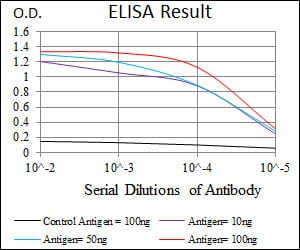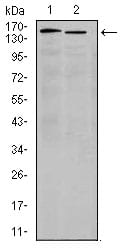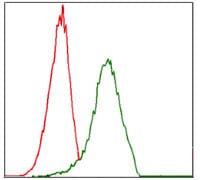


| WB | 1/500 - 1/2000 | Human,Mouse,Rat |
| IF | 咨询技术 | Human,Mouse,Rat |
| IHC | 咨询技术 | Human,Mouse,Rat |
| ICC | 技术咨询 | Human,Mouse,Rat |
| FCM | 1/200 - 1/400 | Human,Mouse,Rat |
| Elisa | 1/10000 | Human,Mouse,Rat |
| Aliases | IA4; CD49D |
| Entrez GeneID | 3676 |
| clone | 5C4 |
| WB Predicted band size | 115kDa |
| Host/Isotype | Mouse IgG1 |
| Antibody Type | Primary antibody |
| Storage | Store at 4°C short term. Aliquot and store at -20°C long term. Avoid freeze/thaw cycles. |
| Species Reactivity | Human |
| Immunogen | Purified recombinant fragment of human ITGA4 expressed in E. Coli. |
| Formulation | Purified antibody in PBS with 0.05% sodium azide |
+ +
以下是3篇关于ITGA4抗体的代表性文献及其摘要概括:
---
1. **文献名称**:*Natalizumab: alpha 4-integrin antagonist selective adhesion molecule inhibitors for MS*
**作者**:Miller, D.H. 等
**摘要**:该综述总结了抗ITGA4抗体药物natalizumab的机制及其在多发性硬化症(MS)治疗中的应用。研究表明,natalizumab通过阻断α4整合素与血管细胞黏附分子(VCAM-1)的结合,抑制免疫细胞向中枢神经系统的迁移,从而减少MS复发和脑部病灶。
---
2. **文献名称**:*Anti-alpha4 integrin therapy for multiple sclerosis: mechanisms and rationale*
**作者**:Yednock, T.A. 等
**摘要**:本文通过动物模型和体外实验,揭示了ITGA4抗体抑制炎症反应的分子机制。研究证明,阻断α4整合素可显著减少白细胞在炎症部位的浸润,为治疗自身免疫性疾病(如克罗恩病和类风湿关节炎)提供了理论基础。
---
3. **文献名称**:*Progressive multifocal leukoencephalopathy after natalizumab therapy for Crohn's disease*
**作者**:Van Assche, G. 等
**摘要**:该临床研究报道了长期使用ITGA4抗体natalizumab的潜在风险,包括进行性多灶性白质脑病(PML)。文章分析了PML的发生与免疫抑制导致JC病毒再激活的关联性,强调治疗中需严格监测患者免疫状态。
---
4. **文献名称**:*Targeting integrin alpha4 in cancer: preclinical and clinical studies*
**作者**:Desgrosellier, J.S. 等
**摘要**:探讨ITGA4抗体在肿瘤治疗中的潜力。研究发现,α4整合素在肿瘤转移和血管生成中起关键作用,阻断该分子可抑制黑色素瘤和乳腺癌的转移,为癌症靶向治疗提供了新方向。
---
这些文献涵盖了ITGA4抗体的治疗机制、临床应用及副作用研究,反映了其在免疫疾病和肿瘤领域的双重价值。
The ITGA4 antibody targets the alpha-4 subunit of integrin α4β1 (VLA-4) and α4β7. cell adhesion molecules critical for immune cell trafficking and inflammation. Integrin α4 binds to ligands like VCAM-1 and MAdCAM-1. facilitating leukocyte migration across endothelial barriers into tissues. This pathway is pivotal in autoimmune and inflammatory diseases, making ITGA4 a therapeutic focus.
Monoclonal antibodies against ITGA4 (e.g., natalizumab) block α4-mediated adhesion, inhibiting immune cell infiltration into organs like the brain or gut. Natalizumab, approved for multiple sclerosis and Crohn’s disease, demonstrates efficacy by reducing relapse rates. However, long-term use carries risks, including progressive multifocal leukoencephalopathy (PML), necessitating careful patient monitoring.
In research, ITGA4 antibodies are tools to study leukocyte-endothelial interactions, lymphocyte homing, and disease mechanisms. They enable flow cytometry to assess α4 expression on immune cells or validate experimental models of inflammation, cancer metastasis, or fibrosis. Challenges include balancing therapeutic benefits with immunosuppressive risks and optimizing selectivity to minimize off-target effects.
Overall, ITGA4 antibodies bridge translational research and clinical practice, offering insights into immune dysregulation while underscoring the need for targeted, safe immunotherapies.
×